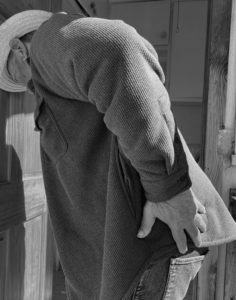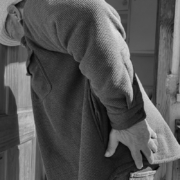The Link Between Pain and Anxiety– Episode 440
 Chronic pain and anxiety have a strong relationship to each other. Anxiety can cause or increase pain and pain can cause anxiety. This can cause a “negative feedback loop” making life increasingly unbearable for those that suffer from pain and anxiety.
Chronic pain and anxiety have a strong relationship to each other. Anxiety can cause or increase pain and pain can cause anxiety. This can cause a “negative feedback loop” making life increasingly unbearable for those that suffer from pain and anxiety.
Understanding the possibility of anxiety as the cause of unexplainable pain is the first step to healing. In addition, addressing the anxiety caused by chronic pain make pain more manageable. In this episode, Ted discusses the link between anxiety and pain as well as what you can do to feel better.
–
–
–
Listen to this podcast episode now >
I work a lot with people who come in with chronic pain but can’t figure out why. Things like back pain, shoulder pain, neck pain, stomach pain. They’ve been to all the doctors, done all the tests, taken the meds, but still can’t get the pain to go away and can’t find a reason for it. As a hypnotherapist, in these types of cases I’m always looking for an emotional reason for the pain and there are many. Anxiety is one very common reason why people have pain.
Chronic pain and anxiety have a strong relationship with each other. Anxiety can cause or exacerbate chronic pain in some people. But chronic pain can also cause anxiety. According to an article titled “Depression and Anxiety in Pain” by Adam KM Woo on the National Library of Medicine website:
· Mood disorders, especially depression and anxiety, play an important role in the exacerbation of pain perception in all clinical settings.
· Anxiety negatively affects thoughts and behaviors which hinders rehabilitation.
This article goes on to make the really important point that pain is no longer seen as a problem in the body such as a lesion that is perceived by the brain as pain. Today, pain is seen from what is called a biopsychosocial model. This model for understanding pain considers not only tissue damage, (physical damage to the body), but also, psychological and environmental factors that are interacting to create the pain experience. According to an article on the Twin Cities Pain Clinic website:
People with chronic pain are three times more likely to develop symptoms of anxiety. Researchers have found that experiencing a chronic illness puts a person at increased risk for developing anxiety or an anxiety disorder.
In other words, anxiety can cause pain, and pain can cause anxiety and depression as well.
Anybody that has ever suffered from chronic pain knows that it’s very stressful. Pain can affect our jobs, our relationships and ultimately our ability to be happy. Especially if the people around you can’t understand your pain or think that you’re imagining it or that it’s “all in your head.”
Chronic, persistent anxiety can also make people more sensitive to any pain they already have. The more they focus or obsess on the pain, the worse it gets, which can in turn increase anxiety which is what we might call the negative feedback loop.
Anxiety can cause pain such as chest pains from panic attacks, stress headaches, and muscle pain.
There are several reasons for this. When we’re stressed, we feel tension in the body; our muscles are tense. This can lead to back, neck and shoulder pain. Chronic tension in the body can also lead to joint pain, as well as headaches and even migraines.
In addition, anxiety and stress trigger hormones that cause inflammation in the body which is one of the most common reasons for pain.
There’s a very popular book by an author by the name of John Sarno called Healing Back Pain, the Mind Body Connection. If you have chronic back pain, I recommend you check out this book. Sarno came up with the term Tension Myositis Syndrome or TMS. According to Wikipedia, Sarno claims that TMS is a psychosomatic illness causing chronic back, neck, and limb pain which is not relieved by standard medical treatments. (Psychosomatic medicine studies physical diseases that are believed to have a mental component derived from stresses and strains of everyday living.)
His theory is that unexplainable pain is a distraction to help people continue to repress unconscious emotional issues.
The TMS syndrome diagnosis is not accepted by the mainstream medical community but then again, the idea of the mind body connection is still not fully understood by mainstream medicine.
The idea of pain being caused by repressed emotional issues is a completely different topic that requires its own deep dive and I’m not going to go there in this episode. But if you listened to my recent podcast Episode 438 titled “5 Hidden Costs of Living with Chronic Anxiety”, then you know that some people don’t even know that they have anxiety. Could it be possible that chronic pain is the result of repressed anxiety or fear that someone may not even know that they have? I think it is possible.
In the same way, there are people that are in pain that don’t want to take the time or effort to deal with it and choose to live with it. They just block it out or try to medicate it with pain meds or other substances. This can create anxiety. This is not a recipe for a healthy happy life.
So many of us are so busy and so overwhelmed that we have lost touch with what we are feeling both physically and emotionally. We owe it to ourselves to pay attention to the signals that our body and our mind are giving us. I’ve devoted a lot of podcasts and blog posts to dealing with anxiety. Here are 3 things that I think are important for dealing with both pain and anxiety.
First, make a commitment to take better care of yourself. Good sleep, good food, exercise, and sufficient downtime can all go a long way towards mitigating or lessening pain and anxiety. I personally feel that chiropractic, acupuncture, and massage can be incredibly helpful for both body pain and anxiety.
Second, mindfulness practices such as yoga, tai chi, meditation, and deep breathing exercises are practices that are thousands of years old and proven to support a higher level of mental and physical health. There’s a yoga joint now in every city, go check one out. Every heard of Reiki? Check it out.
Third, ask for help. I know it’s hard sometimes. I know you’ve already got too much going on. I know that you feel that you don’t have the time or energy or the financial resources to get help. However, let’s focus on what’s possible instead of looking at what’s impossible. If we look for a way to make it happen, usually we can find a way. Find a therapist to help you with your anxieties and fears. Or start by seeking out a pain management specialist or start by going to your doctor if you’ve been putting that off. Start somewhere to make life better by feeling less anxious and more comfortable in your body.
Want to catch up on previous episodes? Click here >
And of course, if this podcast episode resonated with you and got you thinking and possibly motivated to start addressing both pain and anxiety using the powerful tools of hypnotherapy and high-performance coaching, I invite you to request a complimentary consultation to see if what I do is a good fit for you. You can do that by going to TedMoreno.com/contact.
Here is today’s awesome quote by John Sarno:
We must learn to recognize nature’s truths even though we don’t understand them, for some of those truths may still be beyond the ability of the human mind to comprehend. What we need is a compound prescription of humility, imagination, devotion to the truth and, above all, confidence in the eternal wisdom of nature.
Thanks for being here!
Ted



